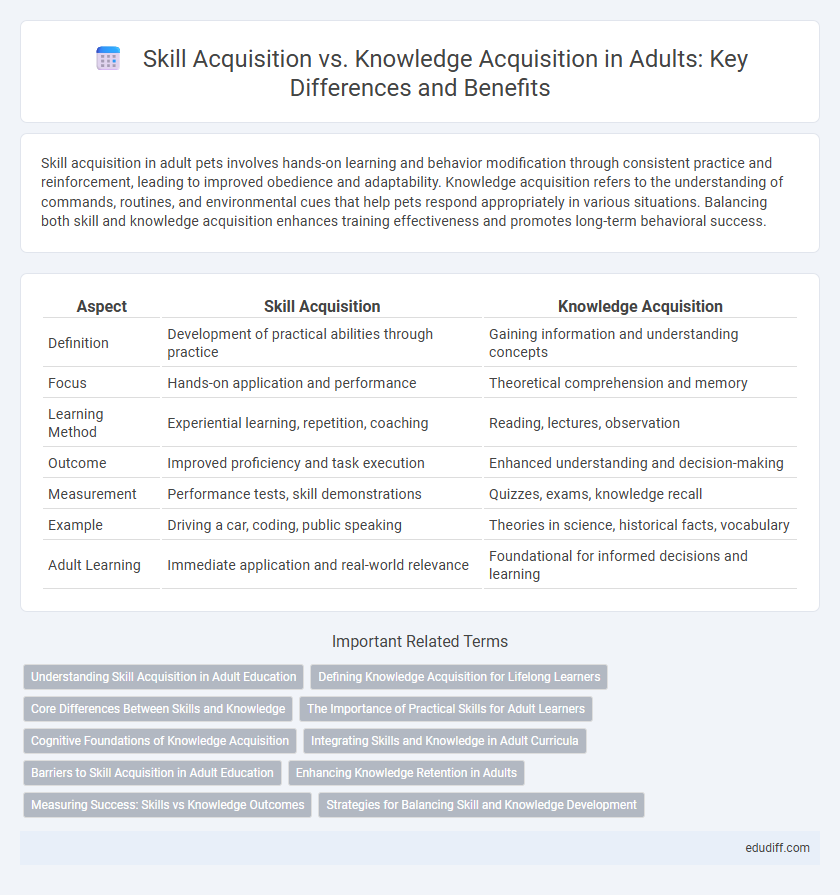Skill acquisition in adult pets involves hands-on learning and behavior modification through consistent practice and reinforcement, leading to improved obedience and adaptability. Knowledge acquisition refers to the understanding of commands, routines, and environmental cues that help pets respond appropriately in various situations. Balancing both skill and knowledge acquisition enhances training effectiveness and promotes long-term behavioral success.
Table of Comparison
| Aspect | Skill Acquisition | Knowledge Acquisition |
|---|---|---|
| Definition | Development of practical abilities through practice | Gaining information and understanding concepts |
| Focus | Hands-on application and performance | Theoretical comprehension and memory |
| Learning Method | Experiential learning, repetition, coaching | Reading, lectures, observation |
| Outcome | Improved proficiency and task execution | Enhanced understanding and decision-making |
| Measurement | Performance tests, skill demonstrations | Quizzes, exams, knowledge recall |
| Example | Driving a car, coding, public speaking | Theories in science, historical facts, vocabulary |
| Adult Learning | Immediate application and real-world relevance | Foundational for informed decisions and learning |
Understanding Skill Acquisition in Adult Education
Skill acquisition in adult education emphasizes practical application and repeated practice to develop competency, contrasting with knowledge acquisition which centers on theoretical understanding. Adults benefit from experiential learning methods such as problem-solving, simulations, and hands-on activities that enhance skill retention and transfer to real-world situations. Effective skill acquisition fosters adaptability and confidence, critical for continuous personal and professional growth in adult learners.
Defining Knowledge Acquisition for Lifelong Learners
Knowledge acquisition for lifelong learners involves the continuous process of gathering, understanding, and integrating information across various domains to adapt to evolving personal and professional demands. It emphasizes cognitive development through reading, observation, and reflective thinking, enabling individuals to build a robust mental framework. This foundational knowledge supports informed decision-making and effective problem-solving in dynamic adult learning environments.
Core Differences Between Skills and Knowledge
Skills involve the practical ability to perform tasks effectively, relying on hands-on experience and muscle memory, while knowledge represents the theoretical understanding of information and concepts. Skills are developed through practice and application, resulting in competency in specific activities, whereas knowledge acquisition is centered on learning facts, principles, and frameworks. Core differences highlight that skills emphasize doing and execution, whereas knowledge focuses on comprehension and cognitive grasp of subjects.
The Importance of Practical Skills for Adult Learners
Practical skills empower adult learners to apply theoretical knowledge directly in real-world scenarios, enhancing job performance and problem-solving abilities. Mastery of hands-on skills fosters greater confidence and adaptability, crucial for career advancement and lifelong learning. Prioritizing skill acquisition alongside knowledge ensures adults remain competitive and effective in rapidly evolving industries.
Cognitive Foundations of Knowledge Acquisition
Skill acquisition involves the progressive development of procedural expertise through practice and experience, emphasizing the automation of cognitive and motor processes. Knowledge acquisition centers on the assimilation and integration of declarative information, forming organized mental representations that support reasoning and problem-solving. The cognitive foundations of knowledge acquisition rely heavily on working memory capacity, attention control, and the encoding of information into long-term memory, facilitating meaningful understanding and application.
Integrating Skills and Knowledge in Adult Curricula
Integrating skills and knowledge in adult curricula enhances practical application and critical thinking, fostering deeper learning outcomes. Curriculum design that balances cognitive understanding with skill development prepares adults for real-world challenges and adaptability in evolving industries. Emphasis on experiential learning, problem-solving tasks, and reflective practices ensures that knowledge complements skill mastery, driving professional growth.
Barriers to Skill Acquisition in Adult Education
Barriers to skill acquisition in adult education often stem from cognitive rigidity and limited time availability, which hinder the ability to practice and internalize new skills effectively. Adults may also face psychological obstacles like fear of failure and decreased motivation, impacting their engagement in experiential learning crucial for skill development. Environmental factors such as lack of access to resources and insufficient personalized feedback further restrict the transfer of theoretical knowledge into practical competence.
Enhancing Knowledge Retention in Adults
Skill acquisition engages procedural memory through hands-on practice, while knowledge acquisition strengthens declarative memory by understanding facts and concepts. Adults enhance knowledge retention by combining active learning techniques such as spaced repetition, retrieval practice, and real-world application. Integrating both skill and knowledge acquisition methods leads to deeper cognitive processing and long-term retention in adult learners.
Measuring Success: Skills vs Knowledge Outcomes
Measuring success in adult learning depends on whether skill acquisition or knowledge acquisition is prioritized, as skills outcomes are often assessed through practical performance and real-world application, while knowledge outcomes are evaluated via tests and theoretical understanding. Competency-based assessments, such as simulations and demonstrative tasks, are effective for gauging skill mastery, whereas written exams and quizzes measure retention and comprehension of information. Organizations and educators increasingly emphasize skill proficiency to ensure learners can translate knowledge into actionable expertise in professional environments.
Strategies for Balancing Skill and Knowledge Development
Effective strategies for balancing skill acquisition and knowledge development in adults include integrating hands-on practice with theoretical learning to reinforce understanding and application. Utilizing spaced repetition alongside real-world problem-solving enhances retention and skill proficiency, ensuring learners can both recall information and perform tasks efficiently. Incorporating feedback loops and reflective exercises supports continuous improvement and bridges the gap between conceptual knowledge and practical expertise.
Skill acquisition vs Knowledge acquisition Infographic

 edudiff.com
edudiff.com